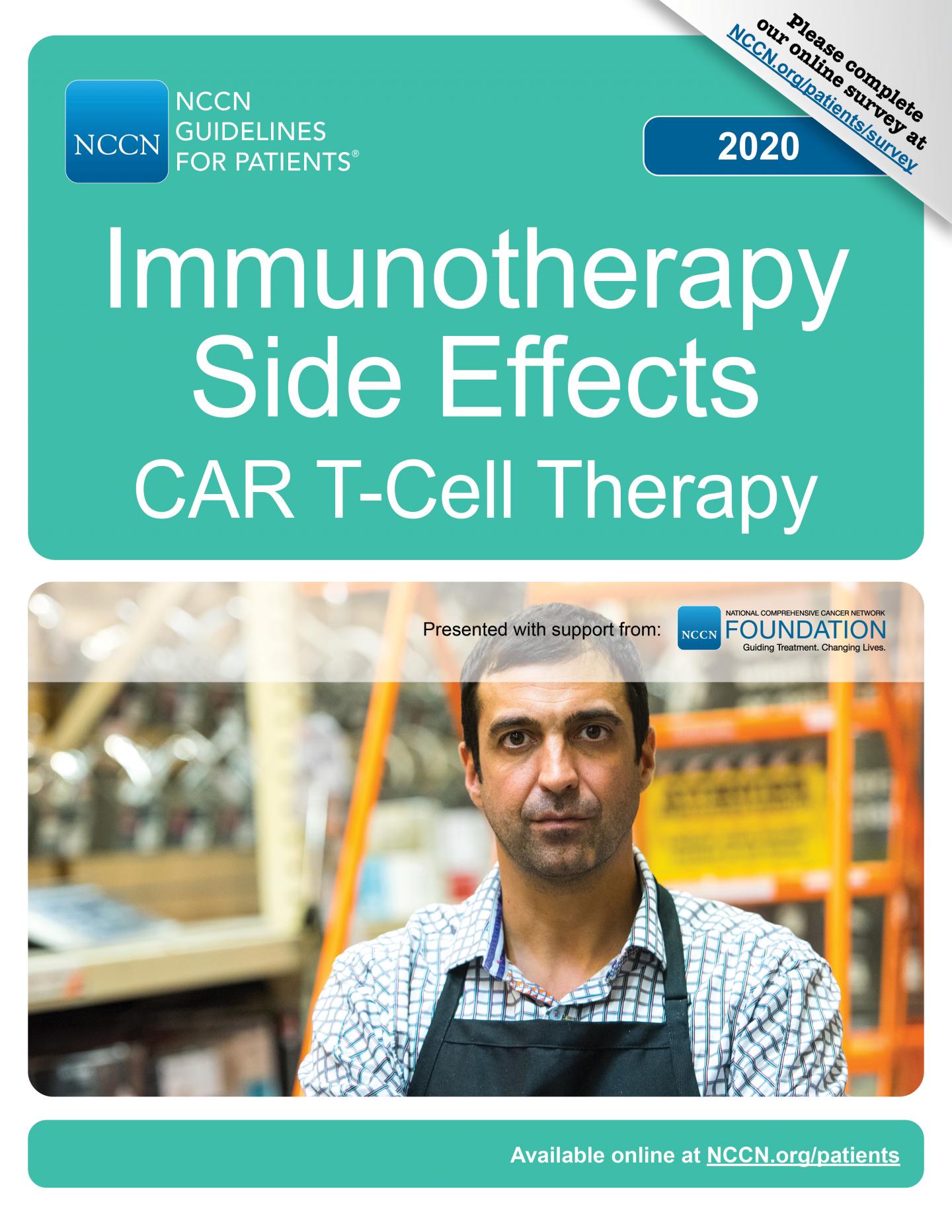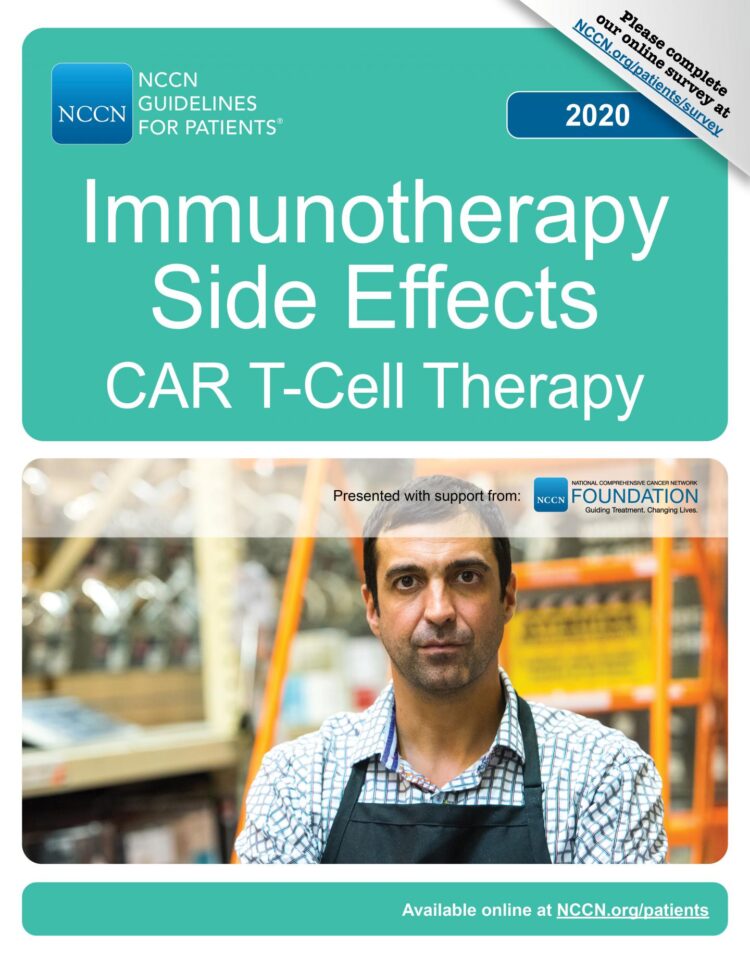National Comprehensive Cancer Network’s new NCCN Guidelines for Patients explain how to recognize and manage immunotherapy-related toxicities, help prepare patients for lengthy treatment duration

Credit: NCCN
PLYMOUTH MEETING, PA [July 1, 2020] — The National Comprehensive Cancer Network® (NCCN®) today announced the completion of the new NCCN Guidelines for Patients®: Immunotherapy Side Effects series, with the publication of a book focused on chimeric antigen receptor (CAR) T-cell therapy. This closely follows the publication of a separate book on immune checkpoint inhibitors, both created with support from the NCCN Foundation®.
“These guidelines explain, organize, and streamline a complex and rapidly evolving concept,” said Olalekan Oluwole, MD, Vanderbilt-Ingram Cancer Center, a member of the NCCN Guidelines® Panel for Management of Immunotherapy-Related Toxicities. “Traditional chemotherapy treatment affects all cells, and often fails to completely eradicate cancer. It can also leave patients with long-term complications, including other forms of cancer. CAR T-cell therapy is new in that, unlike chemotherapy, it focuses on using qualities of the immune system to target cancer. The targeting is akin to a heat seeking missile that won’t stop until it takes out any cell with the target, leading to potential long-term or permanent remission. CAR T is given one time, unlike chemotherapy, which is given over multiple cycles and could go on for months or years. However, patients are often surprised to learn that the single CAR T infusion includes a 28-day monitoring period during which they need to stay in close proximity to their treatment center.”
During that monitoring period, the health care team is primarily watching for two things: cytokine release syndrome (CRS)–in which immune cells affected by the treatment release proteins called cytokines into the blood, stimulating an intense systemic inflammatory response–and immune effector cell-associated neurotoxicity syndrome (ICANS)–a range of neurological side effects. Both CRS and ICANS are generally reversible if treated promptly.
“Before starting CAR T-cell therapy two years ago, my doctor warned me and my wife that it might be a wild rollercoaster ride for a month, but then I would have an excellent chance to be in a long remission,” said Brian Koffman, MDCM (retired), MSEd, Co-Founder, Executive VP, and Chief Medical Officer, CLL Society, Inc. “The NCCN Guidelines for Patients let people know CAR T-cell therapy is a powerful cell-based treatment capable of offering very durable responses in difficult to treat blood cancers, but in some cases the cancer killing can be so intense that the collateral damage may manifest as frightening symptoms. Fortunately these adverse events tend to be predictable, manageable, and short-term. I told my doctor to ‘sign me up,’ and I would say that again today.”
“CRS can set in rapidly, pushing the patient’s body to very high temperatures and taking quite a toll,” cautioned Dr. Oluwole. “However, we researchers are learning more about how to collaborate to predict toxicities and sharing knowledge on recognizing and treating them more quickly. The new NCCN Guidelines for Patients are yet another example of how we’re sharing this important information.”
NCCN Guidelines for Patients are based on the NCCN Guidelines used by clinicians worldwide, which have been found to improve the likelihood of successful treatment and longer survival while also reducing costs, according to numerous independent studies. They cover every major type of cancer as well as prevention, supportive care, and specific patient populations. The NCCN Guidelines represent the consensus of a multidisciplinary panel of experts for each cancer type or clinical scenario based on the latest evidence. The NCCN Guidelines for Patients put the clinical recommendations into easy-to-understand language alongside illustrations, suggested questions, and a glossary of terms and acronyms.
NCCN Guidelines for Patients are available for free online at NCCN.org/patients, or via the NCCN Patient Guides for Cancer App, thanks to funding from the NCCN Foundation®. Printed copies are available at Amazon.com for a nominal fee. The immunotherapy patient guidelines have been endorsed by Be The Match/National Marrow Donor Program® (NMDP), Good Days, The Leukemia & Lymphoma Society (LLS), and Stupid Cancer.
Visit NCCN.org/patients to learn more or make a donation to the NCCN Foundation in support of these and other comprehensive, frequently-updated resources for people with cancer and their loved ones.
###
About the National Comprehensive Cancer Network
The National Comprehensive Cancer Network® (NCCN®) is a not-for-profit alliance of leading cancer centers devoted to patient care, research, and education. NCCN is dedicated to improving and facilitating quality, effective, efficient, and accessible cancer care so patients can live better lives. The NCCN Clinical Practice Guidelines in Oncology (NCCN Guidelines®) provide transparent, evidence-based, expert consensus recommendations for cancer treatment, prevention, and supportive services; they are the recognized standard for clinical direction and policy in cancer management and the most thorough and frequently-updated clinical practice guidelines available in any area of medicine. The NCCN Guidelines for Patients® provide expert cancer treatment information to inform and empower patients and caregivers, through support from the NCCN Foundation®. NCCN also advances continuing education, global initiatives, policy, and research collaboration and publication in oncology. Visit NCCN.org for more information and follow NCCN on Facebook @NCCNorg, Instagram @NCCNorg, and Twitter @NCCN.
About the NCCN Foundation
The NCCN Foundation® was founded by the National Comprehensive Cancer Network® (NCCN®) to empower people with cancer and advance oncology innovation. The NCCN Foundation empowers people with cancer and their caregivers by delivering unbiased expert guidance from the world’s leading cancer experts through the library of NCCN Guidelines for Patients® and other patient education resources. The NCCN Foundation is also committed to advancing cancer treatment by funding the nation’s promising young investigators at the forefront of cancer research. For more information about the NCCN Foundation, visit NCCN.org/patients.
About the CLL Society
The CLL Society Inc. is a patient-centric, physician-curated nonprofit organization focused on patient education, support, advocacy, and research. Dedicated to addressing the unmet needs of the (CLL) chronic lymphocytic leukemia and related blood cancer communities, the CLL Society explains the rapidly changing therapeutic landscape and the importance of clinical trials, supports and builds patient networks, engages in research and educates providers and patients.
Media Contact
Rachel Darwin
[email protected]
Original Source
https:/





